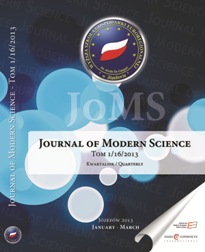Zasada decentralizacji władzy publicznej.
The principle of decentralization of public authority.
Author(s): Dobrochna Ossowska-Salamonowicz, Stanisław BułajewskiSubject(s): Politics / Political Sciences, Politics, Governance, Economic policy, Government/Political systems
Published by: Wydawnictwo Akademii Nauk Stosowanych WSGE im. A. De Gasperi w Józefowie
Keywords: local government; professional self-government; economic selfgovernment; subsidiarity;
Summary/Abstract: The starting point for the discussion presented in this article is art. 15 (1) of the Constitution of the Republic of Poland, which provides that the system of territorial government of Poland ensures decentralization of public authorities. Decentralization is division of power and administrative tasks that are gradually transferred from central state bodies to bodies on various levels of the state’s territorial divisions. Importantly, decentralization is not and should not be temporary and transitory. The basic form of decentralization of the system of administration should be territorial self-government. This is the assumption of art. 16 of the Constitution, which expressly provides that territorial self-government not only participates in the exercise of the powers of public authorities but also performs the tasks associated with these powers in its own name and on their own responsibility. Of course, decentralization of public authorities does not equal complete freedom of action for units of territorial self- -government, as they often must coexist and cooperate with government administration bodies of general competence. Moreover, such bodies as the Prime Minister, the province governor, and the regional accounting chambers supervise the activities of territorial self-government to ensure their legality. When describing the term ‘decentralization’, one must refer to other types of self-government, which also function in Poland pursuant to the present Constitution. The types are professional self-government and business self-government. Professional self-government is a system of organizations that represent persons exercising professions of public-trust. The Constitution of Poland also allows for creation of other types of self-government. These self-governments, too, have some duties, transferred from the state, which they perform mostly in relation to the citizens who are members of public-law corporations.There is no doubt that decentralization of public authorities not only is an obligatory feature of every democratic law-abiding state but also supports the development of civil society. Perhaps it is thanks to decentralization that the government is closer to the citizen who can better exercise control not only of the system of administration, but also of public expenditures made by the system of administration. All the activities of self-government administration, professional self-government, and business self-government constitute implementation of the principle of subsidiarity, provided for in the preamble of the Constitution. We believe that the process of decentralization of public authorities should be continued and that the number of problems that are handled at the lowest possible level should keep increasing.
Journal: Journal of Modern Science
- Issue Year: 14/2012
- Issue No: 3
- Page Range: 323-346
- Page Count: 24
- Language: Polish

